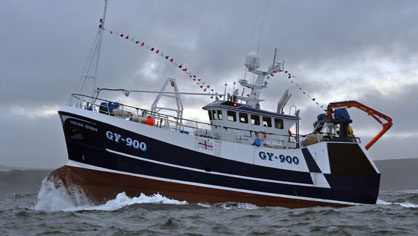25 January 2012
The difficult, thankless, task of managing effort (days at sea restrictions) under the EU Cod Management Plan in the 2012 effort year (from 1st February) has begun..
… with a recent meeting of the English Days at Sea Group, on which the NFFO sits.
Implementing a management plan that has been evaluated by STECF and found to be flawed, yet obliged to implement its provisions because of the rigidity of the EU decision making process, is deeply depressing; especially as the pre-programmed reductions in effort will make life more difficult for the fleets in 2012.
Tough measures can sometimes be accepted even if not liked, but as STECF has concluded that it is not reasonable to expect fishing mortality to fall in line with effort reductions, the conservation rationale for these reductions simply isn’t there. This makes these measures doubly difficult to accept.
In a difficult set of negotiations at the December Council, the UK and other member states successfully fought off the Commission’s interpretation of Article 13 (effort buy-back provisions) of the Cod Management Plan, which had it stood ,would have gutted the Plan of the only element that STECF believes is effective. Although still hemmed in by the poorly drafted provisions of the Plan, there is plenty evidence noted by STECF that the various kinds of cod avoidance practiced by the UK fleet has substantially reduced discards of cod and helped with the rebuilding of the stocks.
Against this background, our priority has been to manage the UK’s effort allocation to avoid any premature closures of fisheries during 2012 and to maximise the flexibility for the fleets operating within the cod recovery zone.
The details of the effort management regime as a result of these discussions will appear shortly on the MMO website.
Selectivity in the Nephrops Fishery
During the December negotiations it became clear that the Commission currently has discarding in the nephrops fishery in its sights. The UK as part of the negotiations on effort for 2012 was obliged to make commitments to work on measures that would improve selectivity in the nephrops fisheries in the West of Scotland, Irish Sea and North Sea.
The Northern Irish fleet has taken the lead in trialling a range of gears as an alternative to the “Swedish grid” which has a range of disadvantages not least its elimination of “by-catch” for which the vessels have legitimate quota and for which there is a ready market. A gear that is effective but suited to the conditions in the Irish Sea is the urgent goal of a number of industry initiatives.
One of the problems faced is the inadequate information on discard rates in different areas and parts of the fishery. Blanket discard rates give the misleading impression that the problem is the same in all areas, when this is patently not the case.
An alternative to more selective gear for nephrops fisheries where discards of cod are already at a minimal level, or which is characterised by catches of whitefish covered by quota, is to develop some form of fully documented fishery, not necessarily using CCTV cameras, that demonstrates that fact.
STECF 1.5%
The bar for exemption from the effort regime has been set very low. Groups of vessels seeking exemption must demonstrate that they catch no more that 1.5% cod in their catch and that the gears used must be evaluated by STECF as achieving this. The emphasis so far has been on the “Swedish grid” because it has been evaluated and approved by STECF but there are a number of other gears better suited to local conditions in the approvals pipeline.
Exemption for Catch Quota Vessels
Vessels that have volunteered for the Catch Quota scheme should by logic be exempt from the effort regime because their contribution to cod mortality is precisely recorded and the vessels, as part of the scheme rules, discard no cod. STECF has been tasked to provide an early response to the Councils request on this point. Progress on this would be a great relief to the vessels concerned not least because of the cost of purchasing additional days/effort in order to remain viable.
Cod Management Plan
All of this is a holding operation whilst the EU Cod Management Plan is evaluated, alternatives outlined and assessed and the political process of adoption completed. The NFFO as part of the North Sea and North West Waters RAC delegations has participated fully in the STECF evaluation meetings and will be involved in the impact assessment meetings this year. Industry and stakeholder access to these important meetings is much better than in the past and it is hoped that the outcomes will reflect this contribution. The Federation has consistently made the case that effort control is a blind alley that at worst actively undermines the rebuilding of cod stocks

